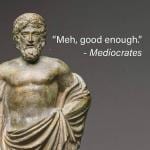Last weekend, Jeanne and I took a quick trip to Greenville, South Carolina to attend a wedding. Other than driving through the state on I-95 headed north or south at various times over the years, the only time either of us had ever spent any time in the state was in Charleston. We spent a couple days there a few years ago vacationing with some Florida friends (we also hit Savannah, GA on that vacation); I also was in Charleston two months before Covid-19 shutdown in January 2020 to see our son and daughter-in-law, Caleb and Alisha, run in a marathon. The wedding on Saturday was not until 4:00, so we took a couple of hours in the morning to explore downtown Greenville.
Greenville is a beautiful town, filled with friendly people, good-looking dogs, and huge trees lining the streets (whose leaves were fully out, unlike the buds on our Rhode Island trees in late April). We found an excellent coffee shop (“Underground Coffee”) for breakfast, then walked a half mile or so up and down Main Street. I noticed a columned white building a block or so away on the other side of the road and said, “that looks like it used to be a courthouse or something.” As it turns out, I was right (I love it when that happens), but the former courthouse is now, among other things, home to one of the best bookstores I have ever set foot in (and trust me, I’ve been in a ton of them). Between Underground Coffee and the bookstore, I know where I would spend 90% of my free time if I lived in Greenville.
Upon walking into M. Judson Bookstore, one is greeted on both sides by the most impressive organized piles of books I’ve ever seen. So impressive, in fact, that some of my Facebook friends, upon seeing the pictures of these piles that I put up on my wall, assumed that they were “fake,” or just the spines for decoration. But they are real books, carefully organized into piles sufficient to hold the counters securely. “I could do that,” I thought (and said later to Jeanne)—and I could, because organizing books is my charism. 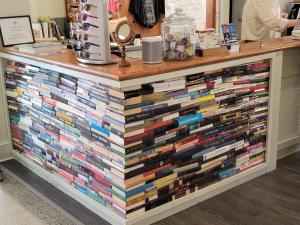
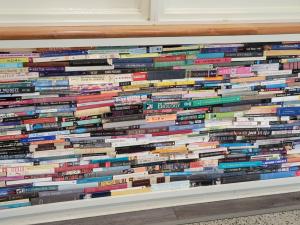
We spent forty-five minutes or so in the bookstore, long enough to convince me that it’s time to admit that I’m never going to get to read every interesting book ever written before I die. The bookstore was so outstanding that I never even climbed to the third floor in the back of the building where an establishment called “Books and Beer” does business. As we left, Jeanne said that M. Judson Bookstore would be a reason to retire in Greenville all by itself. I agreed after noting that we might want to check first whether folks in northwestern South Carolina would want progressive, liberal, died-in-the-wool Northern Yankees living in their community.
When a new ophthalmologist asked me several years ago whether I read very much, I laughed then replied, “I read for a living.” Books are my life. I won’t even venture to guess accurately how many books are in my home and my office, but it is well into the several thousands. And for the second year in a row, Easter Break turned out to be an appropriate time to clean our library room. Facebook reminded me that last year I did this on Good Friday—this year it happened on Easter Monday.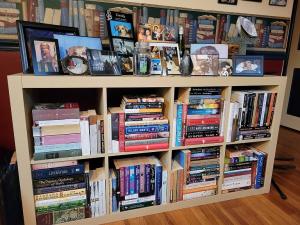
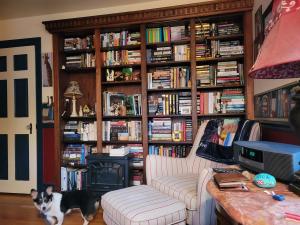
The whole process of taking all of the books off the shelves, dusting both said books and shelves, then putting them back while making room for a dozen or so new books that have been stacked on the floor for some weeks or months, then cleaning everything else in the room, took a few hours. Once finished, I proudly uploaded pictures of the bookshelves to Facebook. Notice, by the way, that Bovina likes to hang out in our library room. Many of my friends noted how well organized it all looked. I responded that “organizing books is my charism.”
According to one definition, a charism is “a gratuitous gift from God, supernatural, transitory, given to the individual for the good of others, for the benefit of the church.” In the fundamentalist, evangelical Protestant tradition I was raised in, we did not use the word “charism” (it sounded too much like “charismatic,” and we sure as hell didn’t want to be identified with those heretics)—we talked about “the gifts of the Spirit.” These are listed in First Corinthians 12 and—depending on the translation—include wisdom, words of knowledge, faith, healing, miracles, prophecy, discernment, speaking in tongues, and interpretation.
In Sunday School we used to guess which gift(s) each of us had (except for speaking in tongues; for some reason we didn’t think that one was legitimate). Nowadays, you can find out what your gift (charism) is by taking any number of online quizzes, in the same way that you find out what character in Shakespeare or Downton Abbey you are, what color your aura is, what kind of dog you would be if you were a dog, and what your spirit animal is. Answers: Lady Macbeth, Mr. Carson, blue, basset hound, penguin (I made the last one up). Your charism should line up with at least some of your personality traits and specific talents.
You’ll notice that “organizing books” is not included in Paul’s list of charisms/gifts of the Spirit. But it should be. Think about all of the talents necessary for book organization that are transferrable to the life of the spirit:
- Take up and read. In the fifth century, Augustine began the path from sex addicted profligate, pear thief, and disappointment to his mother toward becoming Saint Augustine when he overheard a child chanting “take up and read” (for some unknown reason). Augustine started reading scripture, got his shit together, and began his inexorable march toward the Christian Dudes Hall of Fame. My charism begins with recognizing that books change lives.
- Improved memory. I have a general organizational strategy, but nothing precise and certainly nothing written down. But if I’m looking for a book that I haven’t touched in months, I can find it within 30 seconds 99% of the time. My book organization apparently mirrors the organization of my brain—which is either praiseworthy or scary. It does make me wonder why it makes sense to me for Barbara Kingsolver and Charles Dickens to share the same shelf. But it does.
- Adaptability and creativity. None of the shelves in either of the bookcases in the library room are adjustable. This means that I have to adapt the book organization to a fixed framework, not the other way around. Just like the life of faith—it is extraordinarily flexible but does have parameters. I used to enjoy letting some books lean while others stood up straight and others rested on their side. No more—there isn’t space for leaning any more. Either be vertical or horizontal—take your pick. But within the defining parameters of both book organization and faith, the possibilities are endless. I know what the book organizing parameters are. The parameters of faith? Not so much.
- The sacredness of physicality. Every book I own could be loaded onto a Kindle or some similar contraption, which would organize my reading material for me and produce what I want at a moment’s notice, just as Spotify does with my music and podcasts. Not doing it. Books are sacred objects—their physical properties (weight, stiffness of pages, smell) are part of what make them sacred. “Books are sacred??” you ask. “That’s going a bit far.” Not if book organization is your charism.
You like reading everything on a screen? Go for it. I read all student submissions, the headlines and opinion pages from two different papers every morning (guess which ones), and academic articles on a screen. But when it comes to real reading, the tactile physical experience is foundational. The difference between reading a book on a Kindle and reading it with the real thing in your hands is similar to the difference between teaching a class on Zoom and teaching in person. It’s the difference that Job is describing when, after God blows him out of the water following many chapters of silence, Job says “I have heard of you by the hearing of the ear, but now my eyes see you.” There’s nothing like the real thing.


